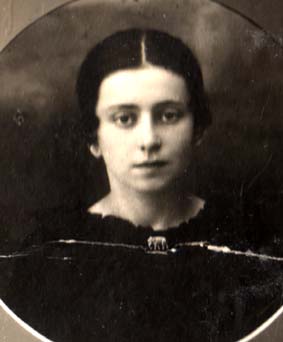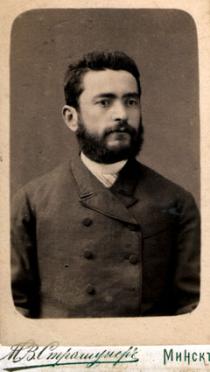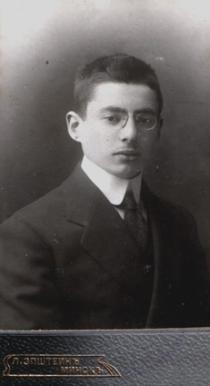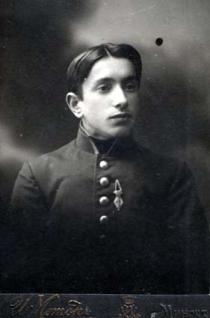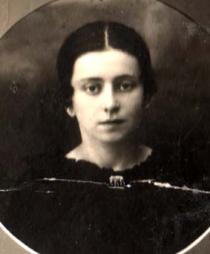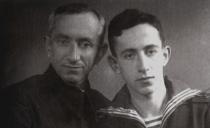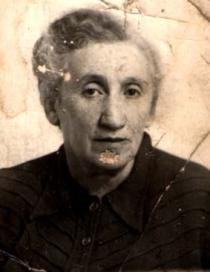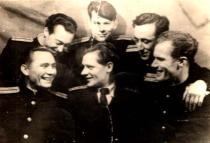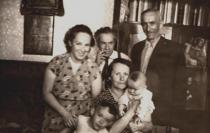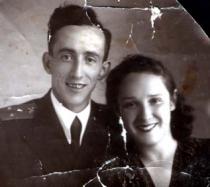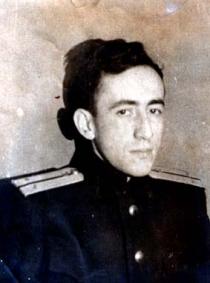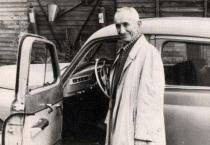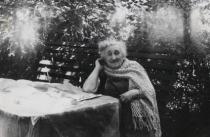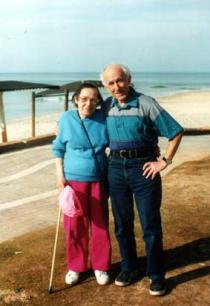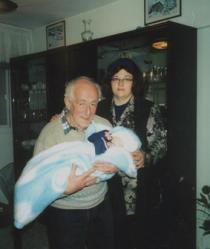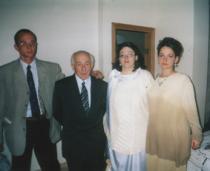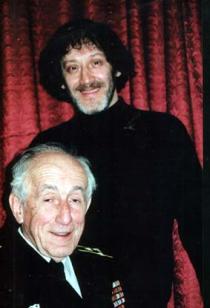This is my aunt Sofia Kabakovà, my father's sister.
I do not know to whom that picture was given, but it was kept by my father. On the back of the picture is written:
" as a keepsake to a dear, sweetie. Kissing you, love you bunches. Will be Yours to death. Sonya. 1917.” The picture was taken in Minsk.
I did not live to see my paternal grandparents. I do not know exactly where they were born, but I know for sure that they came from Byelorussia. When they reached mature age, they lived in Minsk.
Grandfather Morduch did not have a house, but a spacious comfortable apartment in the downtown area.
Grandmother Sofia Kabakovà died at the age of 25-26 while having parturition of her younger daughter in 1900. Grandpa remained with 3 little kids.
My father was only four, the eldest Gersh was 6 and Sofia was a new-born.
My grandfather's second wife was Feiga. She was called Feigale or Fanya at home. They did not have common children. Fanya raised my father and his siblings. My father, his brother and sister loved her very much, like their mother, but they called her auntie.
Grandfather Morduch Kabakov worked as an accountant for his rich relatives Kabakovs. There were two lines of Kabakovs in Minsk- one wealthy and another one, where my grandpa belonged to, was not very rich. The business of the Kabakovs my grandpa worked for was very prosperous. They even had their own synagogue. There were only 50-60 telephone subscribers, 20-30 out of which pertained to public institutions and one of them belonged to the rich family of Kabakovs.
At that time it spoke for welfare. Though, my grandfather, the accountant, was not a poor man either. All his children finished lyceum and obtained higher education in Warsaw and Saint Petersburg, which was rather problematic for the Jews of that time.
My grandpa Morduch Kabakov died of heart stroke in 1916. Grandparents Kabakovs were buried in Jewish cemetery of Minsk. Their tombs were not preserved after Great Patriotic War.
Grandpa Morduch Kabakov was very religious. He strictly observed all Jewish traditions. The solemn holiday of Yom-Kippur was the most revered by grandpa. On that day all Jews, including women went to the synagogue.
They had stayed there all day long and fasted until the first evening star. If some of the children broke the fast, grandpa was infuriated and in father's words the violator got in the neck.
Father's elder brother Gersh Kabakov was born in 1892. He finished Realschule in Minsk. He studied in Poland in Warsaw University. Then he became timber engineer. He lived in Moscow and died in 1966. He was buried in Vostryakovskoye cemetery in Moscow.
His son Matvey Kabakov is currently living in Moscow. He is an engineer like his father. Now he is a great expert in machine-building.
Father had a sister Sofia Kabakovà. She was born in 1900. She remained single. I do not know what she did for a living. I did not know her. She died of consumption in Moscow in 1938. It is not known to me where she was buried. I assume there was a sad story behind it. She was probably buried in Dragomilovskoye cemetery.
Half of that cemetery was Jewish. On the eve of Great Patriotic War in 1941 Moscow authorities decided to build a new avenue, the construction of which was completed after war. Now that avenue is called Kutuzovskiy.
Part of the avenue went through Dragomilovskoye cemetery. I remember there was tittle-tattle that the tombs would be taken to another place, but they did not manage to do that and the cemetery was razed to the ground by the tractors.
